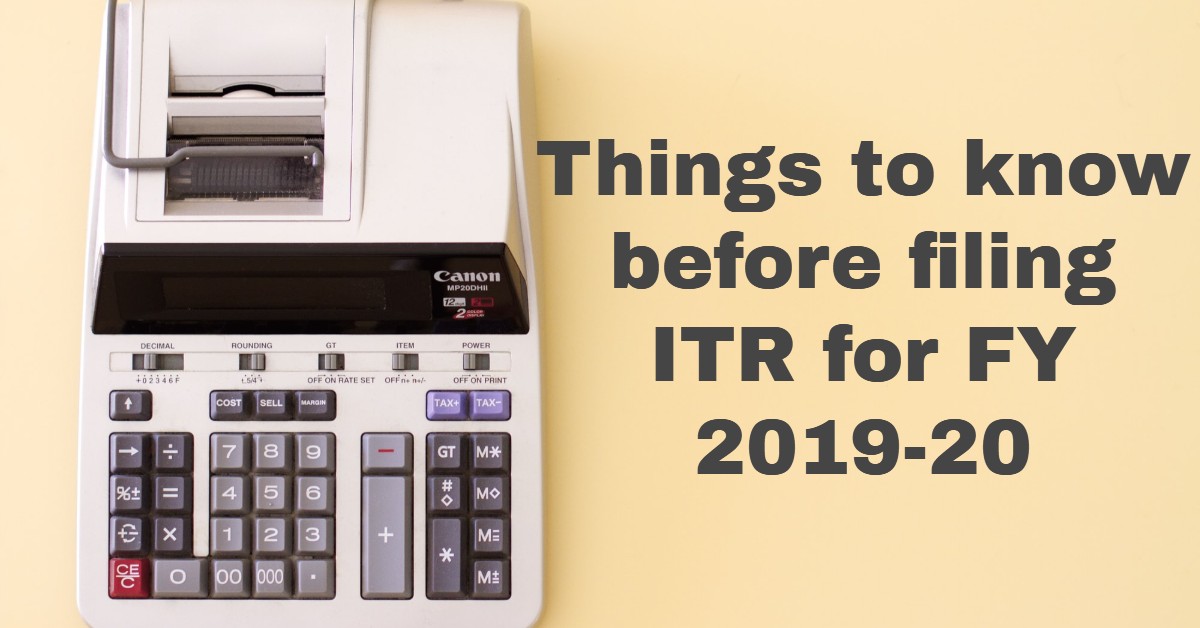The time to file ITR is going to begin soon for FY 2019-20. CBDT has notified various tax forms and provisions regarding the filing of Income Tax Returns. Further, form ITR-1 is available for filing in the income tax e-filing website now.
The last date to file belated ITR for FY 2018-19 is 30th June 2020, meaning it’s the last chance to file ITR for the previous year for those who haven’t filed it yet. Also, June 30th is the last date for making investments for claiming the deductions for FY 19-20. So there’s a lot to do & keep a track of.
Let’s see a brief introduction on notified ITR forms and a few other considerations one should know before filing the ITR
A. Following ITR Forms are notified
1. ITR-1 or Sahaj
This form is applicable for resident individuals other than not ordinarily resident, having income not exceeding Rs. 50 lakhs under the head salaries, house property, and other sources. Agricultural income up to Rs. 5000 is also included.
This form is not applicable to an individual who is a director or has invested in unlisted equity shares.
2. ITR-2
This form is for individuals and HUF who do not have income under the head profits and gains from business or profession.
3. ITR-3
This form is for the individuals having an income under the head profits and gains from business or profession
4. ITR-4 or Sugam
This form is to be filled by resident individuals, HUF, and firms, other than LLP, having an income up to Rs. 50 lakhs under the head PGBP, computed under section 44AD, 44ADA, 44AE.
5. ITR-5
This form is for a person other than:
- Individual
- HUF
- Company, and
- Person filing form ITR-7
6. ITR-6
The form is for companies other than those claiming exemption under section 11.
7. ITR-7
The form is to be filled by a person including companies who are required to furnish return under section 139(4A), 139(4B), 139(4C), or 139(4D).
B. Important considerations while filing ITR
I. New Disclosures required in the ITR
The taxpayers would now be required to disclose certain additional information relating to various common events which weren’t required earlier such as cash deposit, foreign travelling, electricity consumption etc. Some of the important ones are illustrated below:
2. Restriction on Joint Ownership of house: ITR-1 and ITR-4 cannot be filled by the individual taxpayers who are joint owners of a property.
3. Disclosure of Passport: If an individual has a passport, then its number is required to be disclosed in ITR-1Sahaj and ITR-4 Sugam. This disclosure might also be made mandatory in other ITR Forms as and when they are notified.
4. Reporting Cash deposit: the people filing ITR 4-Sugam, have to compulsorily declare the amount deposited as cash in a bank account if such amount exceeds Rs 1 crore during the Financial Year.
5. Disclosure of Foreign travel: If the amount spent on traveling abroad is more than Rs. 2 lakhs during the financial year, then the actual amount spent needs to be disclosed.
6. Disclosure of Electricity consumption: If the amount of electricity consumed is more than Rs 1 lakh in aggregate during the Financial Year, it needs to be disclosed the actual amount.
7. Reporting Investment details: The investments made between the period from 1 April 2020 to 30 June 2020, have to be mentioned in a detailed manner for deduction under chapter VIA with bifurcation of the investment so made.
II. Even more comprehensive 26AS statement
To curb the tax evasion, CBDT has proposed to replace form 26AS with a new Annual Information System.
Erstwhile Form 26AS, among other things, contained the following information:
- Details of TDS deducted by your employer, contractor, company etc.
- Details of immovable property sold during the year;
- Details of car purchased for more than Rs.10 lacs during the year;
- Details of property rent received being more than Rs.50,000 per month during the year;
- Details of the high-value transaction as per AIR (Annual Information return);
- Details of Advance tax paid and self-assessment tax paid.
The amendment in IT Rules 1962 are as under:
- The omission of rule 31AB, which gave information about the annual statement of tax deducted or collected.
- Insertion of Rule 114 I named as Annual Information System.
Form 26AS will be replaced with Annual Information System, which would contain additional information, such as:
- Specified financial transactions – like buying and selling of shares or financial instruments or real estate or high value credit card transactions;
- Information related to any pending income tax proceedings;
- Information related to completed income tax proceedings;
- Information regarding pending demands and refunds for earlier years.
This amendment will come in force with effect from 1 June 2020.
III. Extended due date to file ITR
The last date for filing tax returns in any assessment year is July 31. However, due to the COVID-19 pandemic, the ITR filing date has been extended till November 30, 2020.
